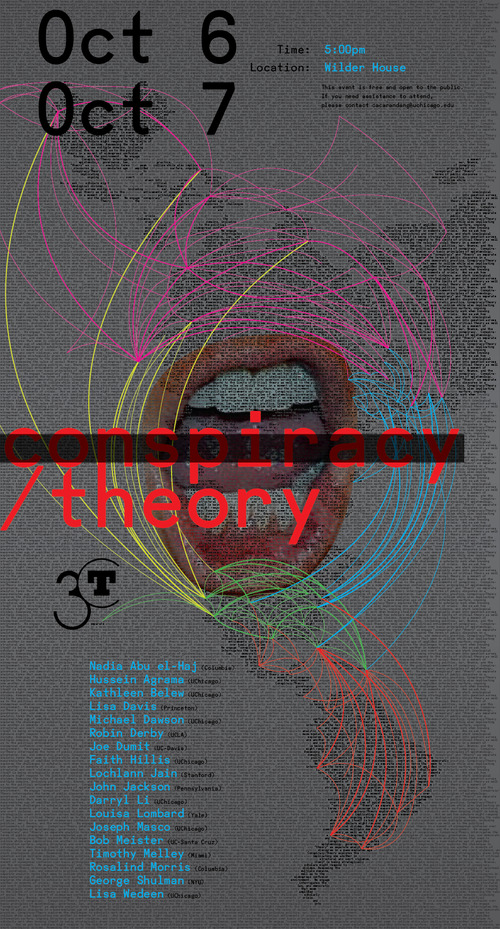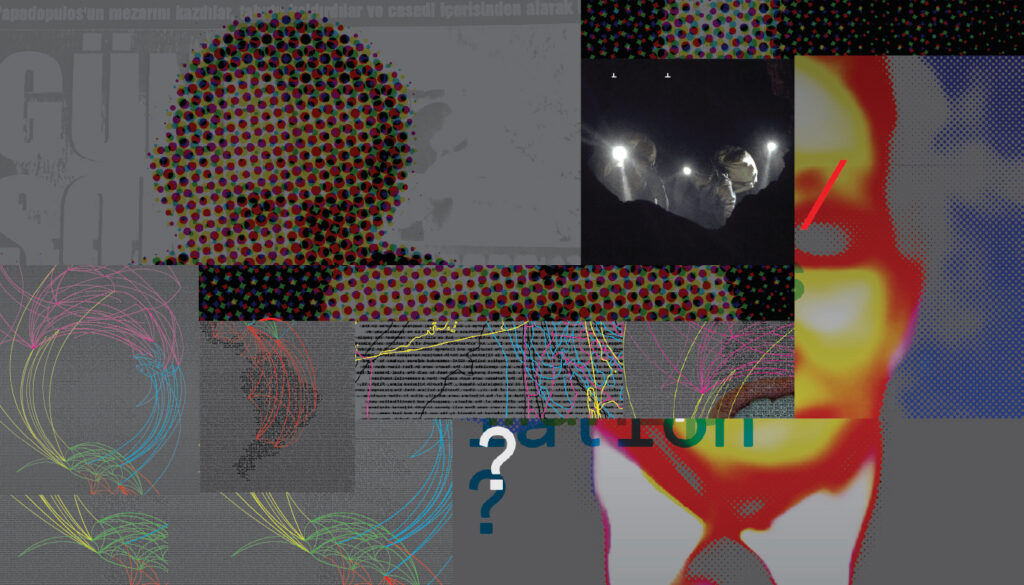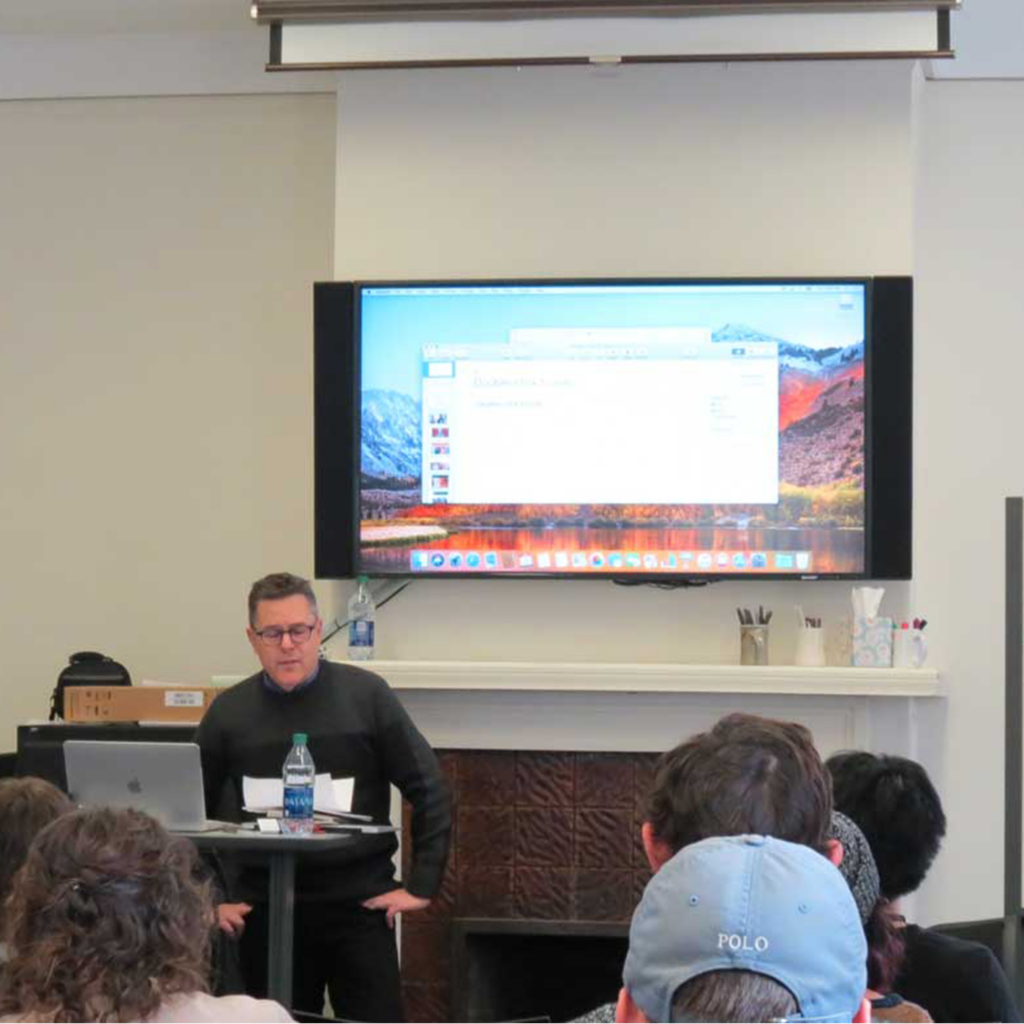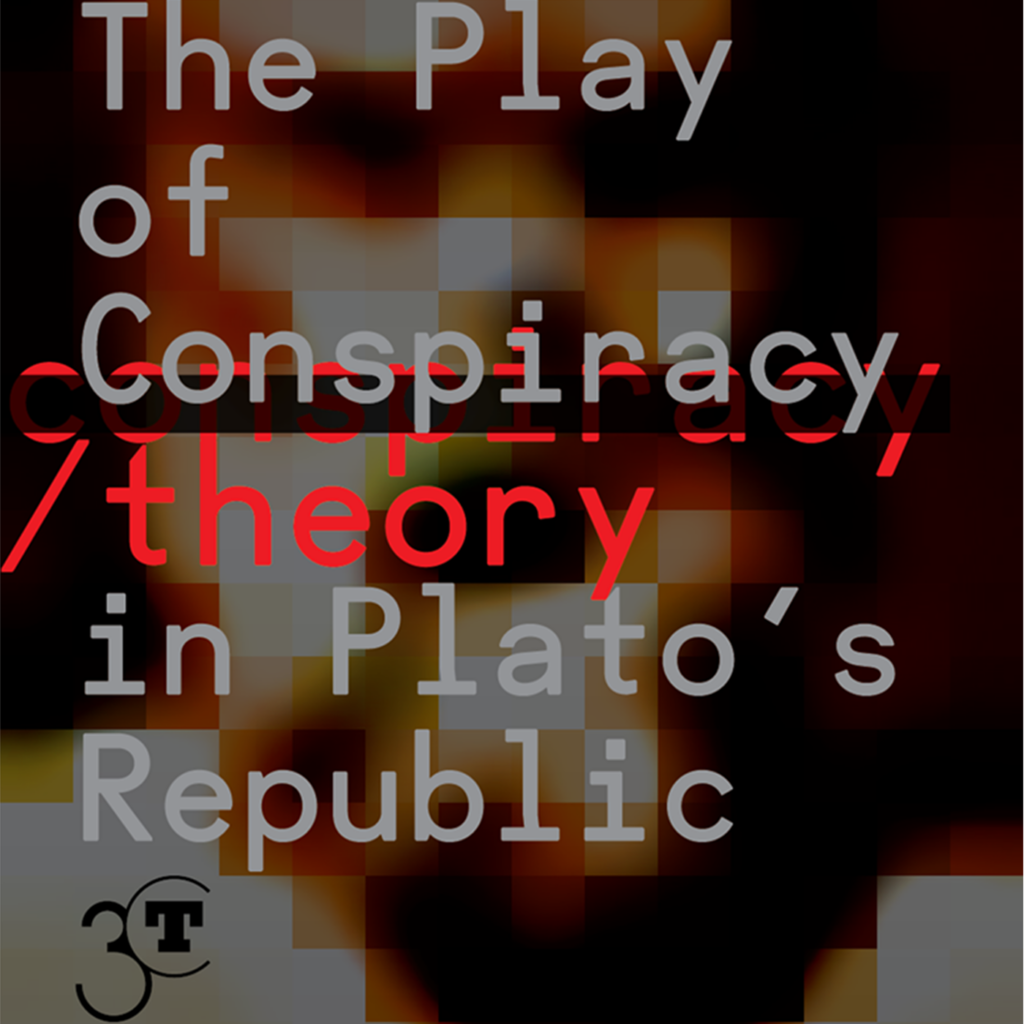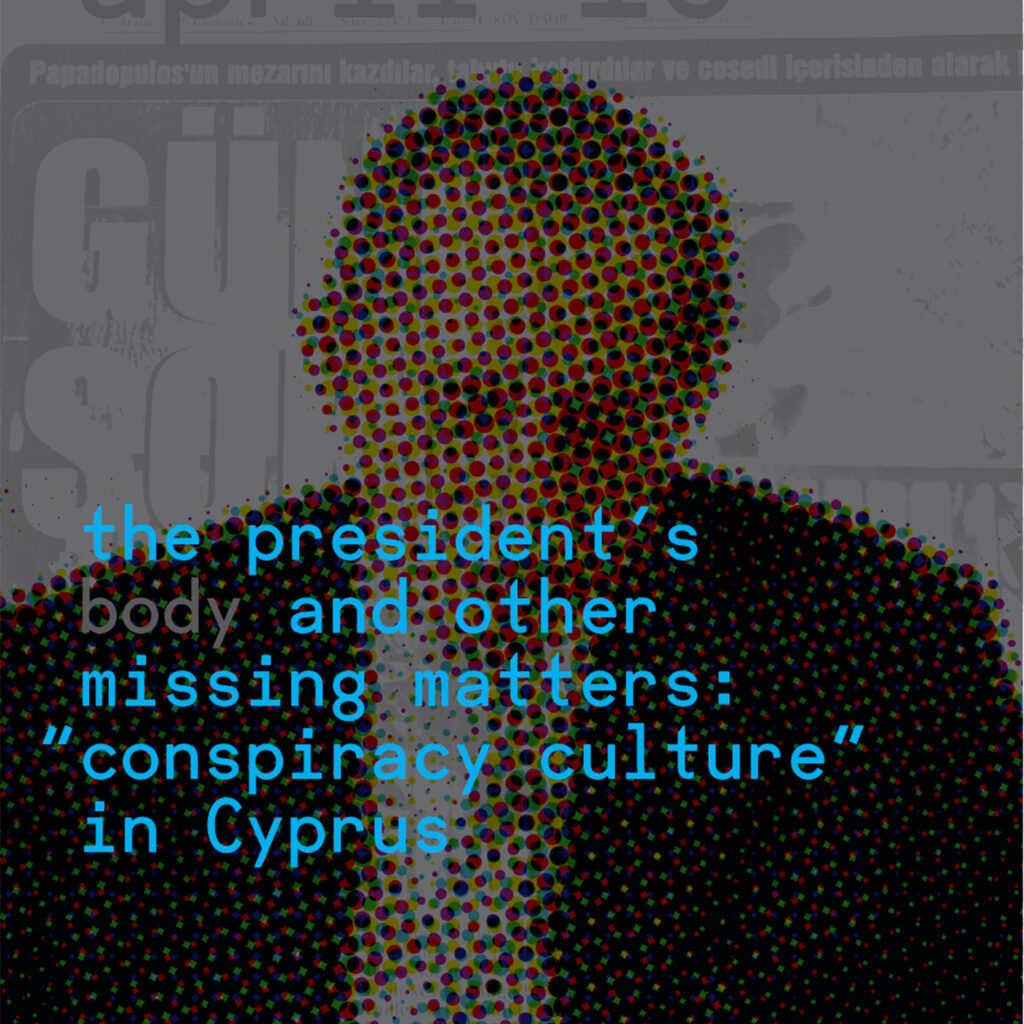Please join us for a two-day conference engaging epistemological problems in contemporary politics and the value of social theory in an age generating new forms of propaganda, deception, and surveillance, as well as tactical rejections of science by both industries and governments.
Conspiracy/Theory considers the intersection of conspiracy and theory, focusing on the imbrication of complex systems across politics, economics, militarism, and technology in the present. Exploring the conditions for knowing in a world where there is often too much information but not of the right kind to judge evidence, ascertain the nature of truth claims, or resolve issues of agency and intent, one goal is to examine how and when intuition, experience, and judgment become marked as either conspiratorial or theoretical. Understanding the elective affinities between conspiracy and theory while appreciating the seductions of each, this project engages the theoretical in conspiracy and the conspiratorial in critical theory, grappling as well with the ways in which suspicion, opacity, networks, uncertainty, and mass mediation function today.
This event is free and open to the public. Registration is not necessary.
FRIDAY, OCTOBER 6
9:30am — Coffee and breakfast
10:30am — Panel I: Origin Stories
George Schulman
“Genre and Impasse in American Politics and Literature”
Faith Hillis
“Conspiracy and its Curious Afterlives: The Case of Russia’s First Hack of Liberal Democracy”
Timothy Melley
“Conspiracy, Theory, and the (Secret) Work of the State”
1:30pm — Panel II: State Programs
Hussein Ali Agrama
“After Muslims: Secrecy and Blasphemy in Modern Liberal State”
Lisa Davis
“The President’s Body: ‘Conspiracy Culture’ and the Problem of Missing Persons in Cyprus”
Joseph Masco
“A False Flag”
4:00pm — Panel III: Corporate Planning
Joseph Dumit
“Corporate Conspiring: Techniques for Calibrating Our Futures”
Robert Meister
“Finance-as-Conspiracy/Market-as-Theory”
Louisa Lombard
“Wartime Profiteering: Two Perspectives on Conspiracies and Facts”
SATURDAY, OCTOBER 7
9:45am — Coffee and breakfast
10:30am — Panel I: War Stories
Nadia Abu El-haj
“Knowing (the) War: On soldiers, Civilians, and Militarism”
Kathleen Belew
“Conspiracy and Cross-pollination: Radical Fringe Alliances”
Darryl Li
“Evidencing Conspiracy: Hearsay and Narrating the Forever War”
1:30pm — Panel II: Survival Techniques
John Jackson
“Conspiracies and Demonic Identities in Contemporary Hip-hop Culture: Ten Short Stories of Racial Paranoia”
Lochlann Jain
“Tastes Reasonable”
Lisa Wedeen
“Authoritarian Apprehensions”
3:30pm — Panel III: Speech Acts
Rosalind Morris
“Wagering Translation in the Underground: Gold, Money, and the Task of Communication in Deindustrializing South Africa”
Robin Derby
“Stealing the Citadelle: Icons of Nationhood and Memories of Theft in Haitian Accounts of Kout Kouto”
Nadia Abu El-Haj is professor in the Departments of Anthropology at Barnard College and Columbia University, and Co-Director of the Center for Palestine Studies at Columbia. The recipient of numerous awards, including from the Social Science Research Council, the MacArthur Foundation, the Harvard Academy for Area and International Studies, and the Institute for Advanced Study at Princeton, and the Harry Frank Guggenheim Foundation, she is the author of journal articles published on topics ranging from the history of archaeology in Palestine to the question of race and genomics today. Abu El-Haj is the author of two books, Facts on the Ground: Archaeological Practice and Territorial Self-Fashioning in Israeli Society (2001), which won the Albert Hourani Annual Book Award from the Middle East Studies Association in 2002, and The Genealogical Science: The Search for Jewish Origins and the Politics of Epistemology (2012). Her major research interests lay at the intersection of anthropology and history of science. While Abu El-Haj’s two books to date have focused on historical sciences (archaeology, and genetic history), she is now working on the field of (military) psychiatry, exploring the complex ethical and political implications of shifting psychiatric and public understandings of the trauma of soldiers. Provisionally titled The Ethics of Trauma: Moral Injury, Combat, and U.S. Empire, this book examines the myriad forms and legacies of violence that the wars in Iraq and Afghanistan have unleashed, and how it is that so many of its attendant horrors remain hidden in plain sight.
Hussein Agrama (PhD, Johns Hopkins, 2005), Associate Professor of Anthropology and of the Social Sciences in the College, has ongoing research interests in the anthropology of law, religion, Islam and Judaism in the Middle East and Europe; secularism, colonial power, and the genealogies of sovereignty and emergency states; and contemporary practices of religious and secular embodiment.
Kathleen Belew is Assistant Professor of U.S. History and the College at the University of Chicago. She specializes in the recent history of the United States, examining the long aftermath of warfare. Her first book, Bring the War Home: The White Power Movement and Paramilitary America (Harvard University Press, April 2018), explores how white power activists wrought a cohesive social movement through a common story about warfare and its weapons, uniforms, and technologies. By uniting previously disparate Ku Klux Klan, neo-Nazi, skinhead, and other groups, the movement carried out escalating acts of violence that reached a crescendo in the 1995 bombing of Oklahoma City. Belew is at work on two new projects, one focusing on processes of militarization in the domestic United States and the other on ideas of the apocalypse in American history and culture. Her award-winning teaching centers on the broad themes of race, gender, violence, identity, and the meaning of war.
Elizabeth (Lisa) Anne Davis is Associate Professor of Anthropology at Princeton University. Her research and writing explore the intersections of the psyche, the body, history, and power in the experience of Greek- and Turkish-speaking communities in the Mediterranean region. Her first book, Bad Souls: Madness and Responsibility in Modern Greece (Duke University Press, 2012), is an ethnographic study of responsibility among psychiatric patients and their caregivers in the multicultural borderland between Greece and Turkey. She has also written on crisis and the suicide “epidemic” in Greece, and is currently completing her second book, The Good of Knowing: War, Time, and Transparency in Cyprus, a collaborative engagement with Cypriot knowledge production about political violence in the 1960s-70s in the domains of forensic science, documentary film, and “conspiracy theory.” These projects share a focus on the epistemological, ethical, and political stakes of scientific knowledge in its local and global forms. Before joining the Princeton faculty in 2009, Davis taught in the Department of Cultural Anthropology at Duke University and at Columbia University as a Mellon Postdoctoral Fellow in the Society of Fellows in the Humanities. In 2017-18, she is an ACLS/Frederick Burkhardt Fellow in the School of Historical Studies at the Institute for Advanced Study, Princeton.
Lauren (Robin) Derby is associate professor of Latin American history at UCLA. Her research has treated dictatorship and everyday life, the long durée social history of the Haitian and Dominican border, and how notions of race, national identity and witchcraft have been articulated in popular media such as rumor, food and animals. Her publications include the prize- winning The Dictator’s Seduction: Politics and the Popular Imagination in the Era of Trujillo; (co-editor) Activating the Past: History and Memory in the Black Atlantic World; (co-editor) The Dominican Republic Reader and articles on Haiti, the Dominican Republic and Puerto Rico. Her current book project, which considers werewolves in light of the ‘animal turn’ is based on oral testimony of demonic animal apparitions in Haiti and the Dominican Republic and is entitled Werewolves and other Bêtes Noires: Sorcery as History in the Haitian-Dominican Borderlands.
Joseph Dumit is the Director of the new Institute for Social Sciences, and in that capacity he is currently developing a new “data studies” program for undergraduates. He is Professor and former Director of Science and Technology Studies and Professor of Anthropology at the University of California Davis. Dumit is on the faculty of the Cultural Studies PhD program, and chair of the Performance Studies PhD program. He is also the co-founder of the Humanities Innovation Lab for game studies and game development (currently making a game on fracking), and work with the KeckCAVES on 3D development for science and the arts. His most recent book is on pharmaceutical marketing and clinical trials called Drugs for Life: How Pharmaceutical Companies Define Our Health (Duke University Press, 2012). His previous work, Picturing Personhood: Brain Scans and Biomedical Identity (Princeton University Press, 2004) addressed how neuroscientists making brain images. Dumit has also co-edited three books: with Gary Lee Downey, Cyborgs & Citadels: Anthropological Interventions in Emerging Sciences and Technologies; with Robbie Davis-Floyd, Cyborg Babies: From Techno-Sex to Techno-Tots, and with Regula Burri, Biomedicine as Culture. For ten years, he was an editor of the journal Culture, Medicine & Psychiatry.
Faith Hillis is associate professor of history at the University of Chicago. She is an historian of imperial Russia, with a special interest in nineteenth- and early twentieth-century politics, culture, and ideas. Her first book, Children of Rus’: Right-Bank Ukraine and the Invention of a Russian Nation, was published by Cornell University Press in 2013. She is currently working on a project on Russian émigré communities in the late nineteenth and early twentieth centuries. Following radical Russians in their travels across the world (and the tsarist secret police who pursued them), the project explores how the global diaspora of Russians abroad shaped politics in the land they had left as well as in their new host nations. Her research has been funded by Fulbright-Hays, the Mellon Foundation, and ACLS, among others, and she has held fellowships at Harvard and Columbia.
S. Lochlann Jain (Anthropology, Stanford University) is the author of two books, Injury (Princeton University Press, 2006) and Malignant: How Cancer Becomes Us (University of California Press, 2013). The latter won several prizes, including the Victor Turner Prize, the Edelstein Prize, the Diana Forsythe Prize, the Fleck Prize, and the Staley Prize. Jain is currently writing a book on the history of vaccine development, and developing pedagogical and ethnographic methods based in theater and art practice. Jain also maintains an art practice.
John L. Jackson, Jr., is Dean of the School of Social Policy & Practice and Richard Perry University Professor at the University of Pennsylvania. He is the author of Harlemworld: Doing Race and Class in Contemporary Black America (University of Chicago Press, 2001); Real Black: Adventures in Racial Sincerity (University of Chicago Press, 2005); Racial Paranoia: The Unintended Consequences of Political Correctness (Basic Civitas, 2008); Thin Description: Ethnography and the African Hebrew Israelites of Jerusalem (Harvard University Press, 2013); Impolite Conversations: On Race, Politics, Sex, Money, and Religion, co-written with Cora Daniels (Atria/Simon & Schuster, 2014), and Televised Redemption: Black Religious Media and Racial Empowerment (NYU Press, 2016), co-written with Carolyn Rouse and Marla Frederick. His is also editor of Social Policy and Social Justice (2016), distributed by the University of Pennsylvania Press. His most recently completed film, co-directed with Deborah A. Thomas, is Bad Friday: Rastafari after Coral Gardens (Third World Newsreel, 2012).
Darryl Li is an Assistant Professor of Anthropology at the University of Chicago.
Louisa Lombard is an assistant professor of anthropology at Yale University. Her research, primarily sited in remote reaches of Central Africa, asks several questions. How are “stateless” arenas constituted, both now and historically? How should we understand people’s quests for privilege, entitlement, rights, and responsibilities when authority is plural and overlapping? When and why do people use violence and/or collaborate? She is currently researching peacekeeping ethics, that is, how peacekeepers charged with implementing a protection agenda develop moral compasses for this work. She is the author of State of Rebellion: Violence and Intervention in the Central African Republic (Zed/Chicago 2016) and Hunting Game: Politics in the Central African Interior (under review with Cambridge University Press), as well as a number of articles on rebellion, armed conservation, and international peacebuilding.
Joseph Masco (University of Chicago) writes and teaches courses on science and technology, U.S. national security culture, political ecology, mass media, and critical theory. He is most recently the author of Theater of Operations: National Security Affect from the Cold War to the War on Terror (Duke University Press, 2014), which locates the origins of the present-day U.S. counterterrorism apparatus in the Cold War’s “balance of terror.” His work has been supported by the American Council of Learned Societies, the John D. And Catherine T. MacArthur Foundation, the Wenner-Gren Foundation and the National Endowment for the Humanities. His previous work, The Nuclear Borderlands: The Manhattan Project in Post–Cold War New Mexico (Princeton University Press, 2006), was the winner of the J. I. Staley Prize from the School for Advanced Research and the Rachel Carson Prize from the Society for the Social Studies of Science.
Robert Meister (History of Conscious, University of California-Santa Cruz): My political thought concerns the moral relations between the beneficiaries of social and political injustice and its victims. After Evil (2011) is a critique of the global discourse of humanitarian that followed the fall of Communism in 1989. My next book, The Wealth of Societies (2015), is about the global discourse of financialization, and aftermath of the near-fall of capitalism in 2008. Previous publications have engaged Marxist analysis, the politics of recognition, political theology, US (and comparative) constitutional law, and legal theory.
Timothy Melley is Professor of English and Director of the Humanities Center at Miami University. He is the author of The Covert Sphere: Secrecy, Fiction, and the National Security State (Cornell, 2012) and Empire of Conspiracy: The Culture of Paranoia in Postwar America (Cornell, 2000). His work has been discussed in The Nation, The L.A. Times, The Village Voice, Le Figaro, Scientific American, and The Wall Street Journal, and his fiction has been featured on PRI’s “This American Life.” He is the recipient of several teaching awards. He is currently writing about the cultural politics of security.
Rosalind C. Morris is Professor of Anthropology at Columbia University. She has written widely on questions of representation, value, and power in the age of mass media, focusing her ethnographic research in South Africa and mainland Southeast Asia. Her most recent book is The Returns of Fetishism: Charles de Brosses and the Afterlives of an Idea (with Daniel H. Leonard, 2017). She has also collaborated on two books with the South African artist William Kentridge, and is currently working as the writer and director on a documentary film about informal gold mining in South Africa, entitled We are Zama Zama.
George Shulman teaches political thought, American studies, and critical race theory at the Gallatin School of Individualized Study of New York University. His second book, American Prophecy: Race and Redemption in American Political Culture (University of Minnesota Press, 2008), was awarded the David Easton Prize in political theory. His current book project is entitled Postmortem Effects: Impasse and Genre in American Politics and Literature.
Lisa Wedeen (Political Science, UChicago) is currently co-director of 3CT. Her major areas of interest include comparative politics; the Middle East; political theory; feminist theory; and qualitative methods. Her publications include Ambiguities of Domination: Politics, Rhetoric, and Symbols in Contemporary Syria (1999); “Conceptualizing ‘Culture’: Possibilities for Political Science” (2002); “Concepts and Commitments in the Study of Democracy” (2004), Peripheral Visions: Publics, Power and Performance in Yemen (2008), “Ethnography as an Interpretive Enterprise” (2009), “Reflections on Ethnographic Work in Political Science” (2010), and “Ideology and Humor in Dark Times: Notes from Syria” (2013). She is the recipient of the David Collier Mid-Career Achievement Award and an NSF fellowship. She is currently working on a book about ideology, neoliberal autocracy, and generational change in present-day Syria.
This conference is organized by 3CT with support from the Department of Anthropology, the Department of Political Science, and the Morris Fishbein Center for the History of Science and Medicine.
